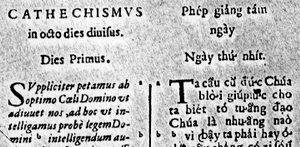
A catechism in Latin and Vietnamese by Alexandre de Rhodes (1591-1660)
In The Portuguese Seaborne Empire 1415-1825 (New York: Knopf, 1969), Charles Boxer mentions the Vietnamese priest Filipe Binh, alias Filipe do Rosario, who wrote extensively in Vietnamese, Portuguese, and Latin. Boxer is discussing the institution of the Portuguese Padroado, by which the Portuguese monarchs exerted direct control over the missions in the Portuguese imperial sphere, and excluded missionaries from Spain, France, Italy, and other countries. The Padroado was initially granted willingly by the Vatican in the 16th century, when Rome was not primarily interested in missionary activity in the new overseas empires. But later competition from other countries and lack of attention by the monarchy led to all kinds of problems, political, financial, and religious. By the late 18th century it was essentially moribund, a liability rather than an asset to the Church, and the Portuguese were having severe trouble staffing the missions.
This peculiar institution [the Padroado] was, moreover, capable of inspiring a devoted loyalty in some of the native clergy who served it, even in its darkest days. Among them is the rather pathetic figure of the Vietnamese priest Filipe Binh, alias Filipe do Rosario. Born and bred in the Jesuits’ Tongking mission, he arrived at Lisbon with three companions in 1796, as an envoy from his people to ask for some Portuguese missionaries under the auspices of the Padroado. The times of the French Revolutionary and Napoleonic Wars were singularly unpropitious for any such project, and he died in 1833 without seeing his native land again. He was the last defender of the Padroado in Indochina, and he left twenty-three volumes of manuscript works in Vietnamese, Portuguese and Latin as proof of his attachment to this lost cause. (p. 247)
Now, where could one find father Binh’s Latin writings? The only evidence of Binh’s work in Worldcat is a microfilm of manuscripts in the Bibliotheca Vaticana, of which Cornell University owns a copy. The catalogue entry mentions Orationes (reel 5), Historica chronolologica dos Pontifices (reel 4). Reel 2 has an intriguing entry for a Dictionarium Annamiticum, seu Tunkinese Lusitana, & Latina declaratione, evidently a Vietnamese dictionary with Portuguese and Latin definitions. It is unclear how that would relate to Dictionarium Annamiticum Lusitanum et Latinum by Alexandre de Rhodes (1591-1660), which appeared in 1651.
I would be most curious to know if anybody has more information about Binh and his Latin writings. He sounds like an interesting figure, and his works seem never to have been printed.